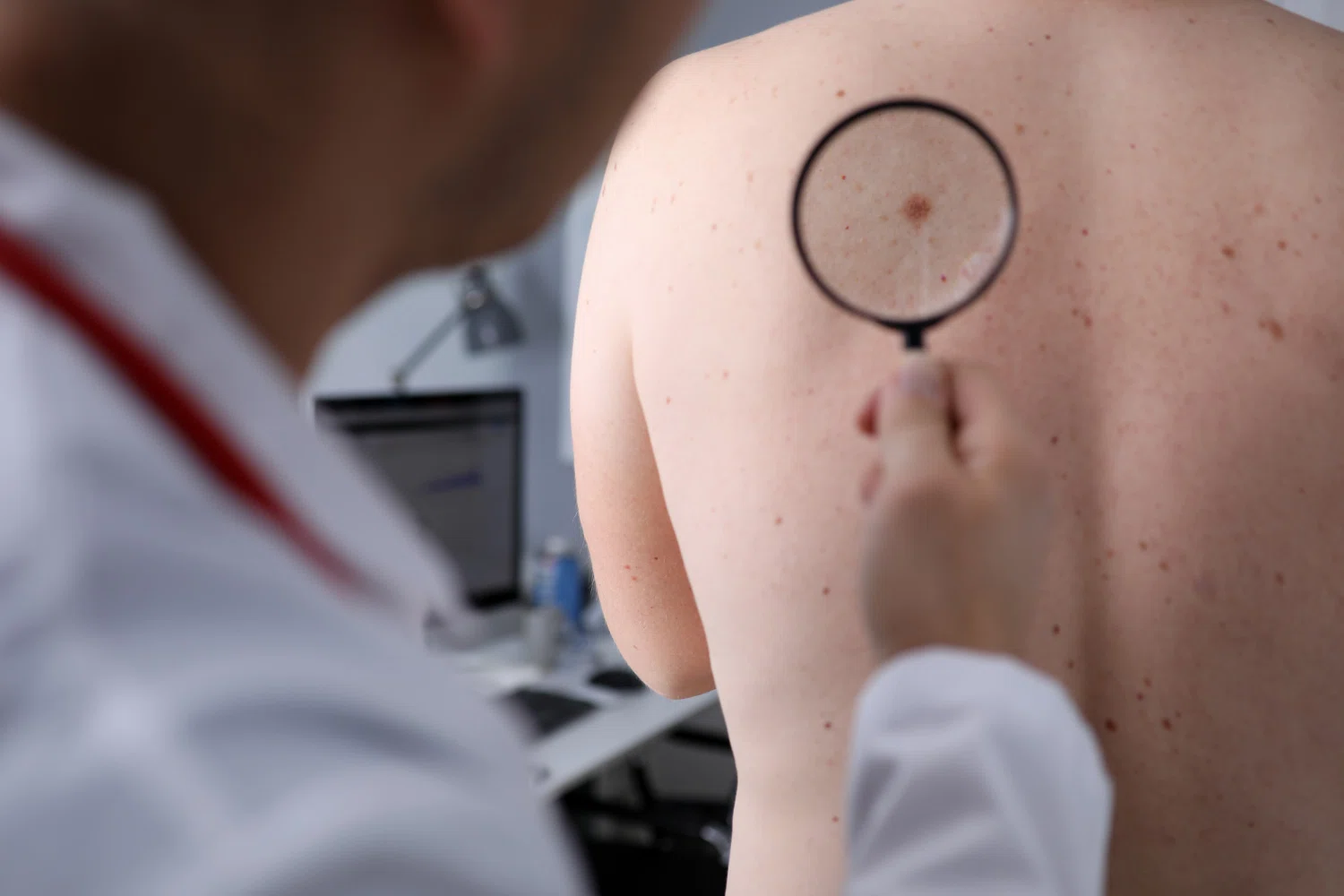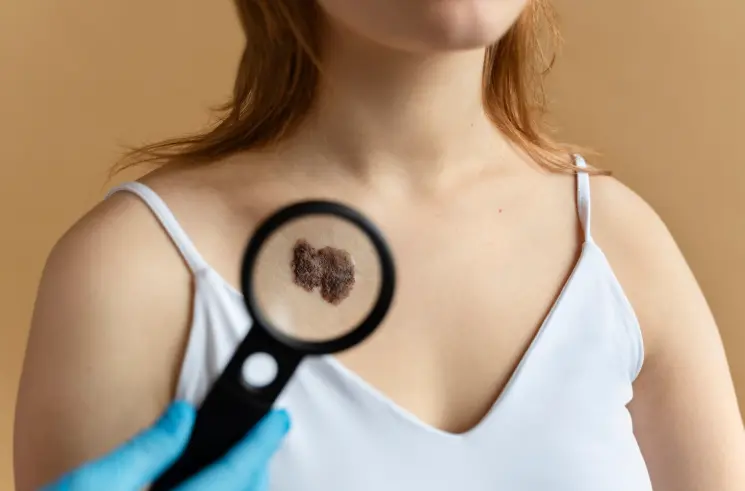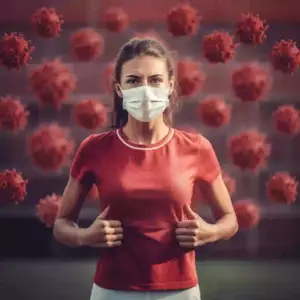Early Detection and Effective Skin Cancer Care
Get expert diagnosis, advanced therapies, and personalized skin cancer treatment from specialists at VS Hospitals.

Skin Cancer
Skin cancer is one of the most common types of cancer, but it is also one of the most preventable and treatable cancers when detected early. Skin cancer develops in the skin cells and is usually caused by the uncontrolled growth of abnormal cells. The three most common types of skin cancer are basal cell carcinoma (BCC), squamous cell carcinoma (SCC), and melanoma. While BCC and SCC are more common and typically less aggressive, melanoma is rarer but far more dangerous due to its ability to spread rapidly to other parts of the body.
At VS Hospitals, we provide comprehensive care for skin cancer, from early detection and diagnosis to advanced treatment options, ensuring the best possible outcome for each patient.

Early Detection Saves Lives
Early detection and treatment are crucial for improving the chances of survival. If you notice any concerning symptoms, consult a healthcare provider immediately.
Signs and Symptoms
New Growths or Sores
A new mole, bump, or growth on the skin that doesn’t heal over time may be an indication of skin cancer.
Changes in Existing Moles
If an existing mole changes shape, size, color, or texture, or starts to bleed or itch, it could be a warning sign of skin cancer.
Itching or Pain
Skin cancers, particularly melanomas, can cause itching or pain in the affected area.
Bleeding or Crusting
If a mole or growth starts to bleed, crust, or ooze, it is important to seek medical attention immediately.
Unusual Coloration
Skin cancers, especially melanoma, can appear with uneven or multiple colors, such as shades of brown, black, red, or even white.
Sores that Don’t Heal
If a sore or lesion doesn’t heal or keeps coming back, it could be a sign of squamous cell carcinoma.
Changes in Skin Texture
Skin cancer may cause the affected area to appear rough, scaly, or ulcerated.
Blood in Urine
Hematuria - pink, red, or dark urine, the most common symptom
Frequent Urination
Feeling the need to urinate frequently, even when bladder is not full
Painful Urination
Experiencing pain or burning sensation while urinating
Back or Pelvic Pain
Pain that occurs as the cancer grows and spreads
Unexplained Weight Loss
Significant weight loss not related to diet or exercise
Fatigue
Feeling unusually tired or weak without a clear cause
If you notice any of these symptoms or changes in your skin, it is crucial to consult with a healthcare provider for further evaluation and potential biopsy.
Meet Our Expert Skin Cancer Oncologists
Risk Factors
Smoking
Smoking is one of the leading causes of bladder cancer. Chemicals in tobacco smoke can damage the lining of the bladder, increasing the risk.

Gender
Men are at a higher risk of developing bladder cancer than women.

Chronic Bladder Infections or Inflammation
Conditions such as bladder infections and long-term bladder inflammation can increase the risk.

Exposure to Chemicals
Prolonged exposure to certain chemicals, especially those used in the dye industry, rubber production, and chemical manufacturing, increases the risk.

Excessive Sun Exposure
Prolonged exposure to the sun’s ultraviolet (UV) rays is the leading cause of skin cancer. Sunburns, especially in childhood, increase the risk.

Tanning Bed Use
Using tanning beds or sunlamps exposes the skin to harmful UV radiation, which increases the risk of developing skin cancer, particularly melanoma.

Fair Skin
Individuals with fair or light skin, blue or green eyes, and red or blonde hair have a higher risk of developing skin cancer, as they have less melanin, which provides some protection from UV rays.

Family History
A family history of skin cancer increases the risk, especially for melanoma. If close relatives have had skin cancer, you are at a higher risk.

Personal History of Skin Cancer
If you’ve had skin cancer in the past, you are more likely to develop it again.

Weakened Immune System
People with weakened immune systems, such as those on immunosuppressive drugs or those with HIV/AIDS, are at increased risk of skin cancer.

Age
The risk of skin cancer increases with age, as the cumulative damage from sun exposure over the years adds up.

Certain Medical Conditions
Conditions like xeroderma pigmentosum, which causes extreme sensitivity to UV light, can increase the risk of skin cancer.

Skin Cancer
Diet and Nutrition
Prevention
Diagnosis
Key Services
Key Facilities
While diet alone cannot prevent skin cancer, certain nutrients can support overall skin health and may help reduce the risk of developing skin cancer. Here are some dietary recommendations:
- Antioxidants-Rich Foods: A diet high in antioxidants can help protect skin cells from UV damage. Include a variety of fruits and vegetables such as berries, tomatoes, spinach, and kale, which are rich in vitamins C and E.
- Healthy Fats: Omega-3 fatty acids found in foods such as fatty fish (salmon, mackerel), flaxseeds, and walnuts can help reduce inflammation and improve skin health.
- Hydration: Drinking plenty of water is essential for maintaining skin moisture and overall skin health. Proper hydration can help prevent skin dryness and irritation.
- Green Tea: Green tea contains polyphenols that may offer protection from UV damage and skin cancer. Drinking green tea or including it in your diet may be beneficial for overall skin health.
- Avoid Processed Foods: A diet high in processed foods, added sugars, and unhealthy fats can promote inflammation and may negatively impact skin health. Focus on whole, nutrient-dense foods instead.
- Vitamin D: While sun exposure can increase the risk of skin cancer, vitamin D is important for overall health. You can obtain vitamin D from fortified foods or supplements, particularly if you have limited sun exposure.
- Curcumin: Found in turmeric, curcumin is an anti-inflammatory compound that may help protect the skin from UV damage and reduce the risk of skin cancer.
Consulting a registered dietitian who specializes in oncology can help ensure that you are getting the right nutrients to support your overall health and skin care, particularly during treatment.
Although skin cancer cannot be entirely prevented, there are several steps you can take to reduce your risk:
- Avoid Excessive Sun Exposure: Limit your time in the sun, especially during peak hours (10 a.m. to 4 p.m.), when UV rays are strongest. Wear protective clothing, including hats and sunglasses, and seek shade whenever possible.
- Use Sunscreen: Apply broad-spectrum sunscreen with an SPF of 30 or higher every two hours, and more often if swimming or sweating. Sunscreen helps protect your skin from harmful UV rays.
- Avoid Tanning Beds: Tanning beds expose the skin to harmful UV radiation, which increases the risk of developing skin cancer. Avoid them entirely to reduce your risk.
- Regular Skin Checks: Perform self-exams of your skin regularly to check for new moles or any changes in existing ones. If you notice anything unusual, consult a healthcare provider for a professional evaluation.
- Protective Clothing: Wear sun-protective clothing that covers the skin, along with a wide-brimmed hat and UV-blocking sunglasses when outdoors.
- Healthy Lifestyle: Eating a healthy diet, maintaining a healthy weight, and staying hydrated can improve your overall health and support skin protection.
- Avoid Smoking: Smoking can damage the skin and reduce the body’s ability to repair skin cells, making you more vulnerable to skin cancer. Quitting smoking can significantly lower your risk.
These preventive measures, combined with regular skin checks, can help reduce the risk of developing skin cancer and promote overall skin health.
The diagnosis of skin cancer typically involves a combination of physical exams, skin assessments, and laboratory tests. Common diagnostic procedures include:
- Physical Exam: A healthcare provider will visually examine your skin for abnormal moles or growths. The doctor will look for irregularities in the shape, size, and color of moles.
- Skin Biopsy: If a suspicious mole or growth is found, a skin biopsy is performed to remove a small sample of the tissue. The sample is examined under a microscope to determine if cancer cells are present.
- Dermatoscopy: This non-invasive procedure uses a specialized magnifying lens to closely examine skin lesions. It helps doctors assess whether a lesion is benign or potentially cancerous.
- Imaging Tests: In some cases, imaging tests like CT scans or MRIs may be used to determine if skin cancer has spread to other parts of the body, particularly in advanced stages.
Accurate diagnosis is essential for determining the type, stage, and treatment options for skin cancer.
VS Hospitals offers a comprehensive range of services for the diagnosis, treatment, and management of skin cancer. These services include:
- Skin Cancer Screening: Regular skin checks, including visual exams and biopsies, to detect skin cancer early.
- Surgical Treatment: Surgery is the most common treatment for skin cancer. VS Hospitals offers various types of skin cancer surgeries, including excisional surgery, Mohs surgery (a precise technique for removing cancerous tissue), and cryotherapy (freezing abnormal tissue).
- Radiation Therapy: Radiation therapy may be used for patients with skin cancer that cannot be surgically removed or for those with advanced disease.
- Targeted Therapy: Targeted treatments for advanced skin cancer, especially for melanoma, are available to help block the growth of cancer cells.
- Immunotherapy: Immunotherapy treatments are used to help stimulate the body’s immune system to fight skin cancer, particularly in melanoma cases.
- Palliative Care: For patients with advanced skin cancer, palliative care is available to alleviate pain and improve the quality of life.
VS Hospitals is equipped with the latest technology and facilities to provide comprehensive care for skin cancer patients:
- Advanced Diagnostic Imaging: The hospital uses cutting-edge imaging technologies, including dermatoscopy and biopsy, to accurately diagnose skin cancer.
- Surgical Suites: VS Hospitals offers modern surgical suites for skin cancer surgeries, including Mohs surgery and other minimally invasive techniques.
- Radiation Therapy Units: The hospital provides radiation therapy units equipped with the latest technology to treat skin cancer effectively.
- Oncology Department: The oncology department at VS Hospitals specializes in skin cancer treatment, offering a multidisciplinary approach to care with experienced oncologists, dermatologists, and surgeons.
- Patient-Centered Care: The hospital emphasizes holistic care, offering private rooms, psychological support, nutritional counseling, and post-treatment rehabilitation services.
Top Medical Facilities at Our Multispeciality Hospital – Here’s What Makes Us Different!
Ready to Begin Your Skin Cancer Care Journey?
Learn More About Skin Cancer Care
Frequently Asked Questions
Common symptoms include a new or changing mole, bleeding or itching in a mole, unexplained pain in the skin, and changes in the appearance of existing moles. If any of these symptoms persist, consult a healthcare provider for an evaluation.
Treatment at VS Hospitals includes surgery (excisional or Mohs surgery), radiation therapy, targeted therapy, and immunotherapy, depending on the type and stage of skin cancer. A personalized treatment plan is developed for each patient.
While skin cancer cannot always be prevented, adopting preventive measures such as avoiding excessive sun exposure, using sunscreen, wearing protective clothing, and having regular skin checks can significantly reduce the risk of skin cancer.
